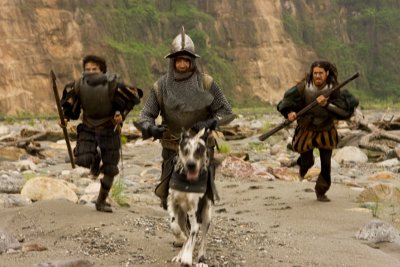Reviews - Even the Rain
Even the Rain
Reviewed By John Porter

Even the Rain
Iciar Bolain's 'Even the Rain' was presented to The Alhambra on Sunday as part of a sequence of movies concerned with the theme of water, and although the factual aspects of the back-story were rain-drenched, what we actually witnessed was slightly deeper. Here we had a cyclic series of guilty admittances, both of past and present deeds, and although there was a slim thread of redemption, the overall feeling was one of shock as to Latin America's treatment by the Western superpowers.
The premise of the movie is simple, although rarely understated or subtle. However one could easily ask the question, when is colonialism, in its many guises, understated or subtle? A Spanish production company arrive in Bolivia to make a movie portraying Columbus' conquest of the New World five hundred earlier. They begin to hire extras, and discover a natural, yet ferocious acting talent in the form of a local man, Daniel (Juan Carlos Aduviri), who is also revealed to be the leader of a community water rights movement in conflict with the authorities. So begin the rehearsals, punctuated by Daniel's sporadic arrests and the efforts of the director, Sebastian (Gael Garcia Bernal), and producer, Costa (Louis Tosar), to negotiate his release long enough to shoot his scenes.
From the first sequence it is clear that this will be an experience of alternating points of view as we watch the poverty stricken streets of Cochabamba from the film crew's jeep, the locals staring back at us, directly into the lens. Here we are introduced to the viewpoint of the observer, a girl who has been hired to film a documentary on the making of Sebastien's movie. This viewpoint, after being made obvious through a change to grainy film stock, slowly gives way to the vision of the filmmakers charting Columbus' invasion, and eventually the figure of the documentarian disappears completely. Her initial presence however serves to alert the viewer that perhaps we are watching a portion of history that goes beyond the reenactment of the conquistadors, and that events happening in the present are history in the making. 'Even the Rain' is laying foundations to draw parallels between past and present, and the important, if problematic nature, of the recording of such.
At one point Sebastian says that, "[the struggle for water] will be forgotten, but our movie will last forever", but by now we are unsure during much of what is shown, whether we are witnessing footage shot for his film, or simply a part of our narrative. The characters’ speeches, and the long, roaming shots ending up resting on Daniel, although initially implied as being part of the film-within-a-film, are thrown into ambiguity by their obvious parallels to reality. At one point, the movie even attempts to reflect this back onto itself when, upon Daniel's arrest after his acting out a cross-burning scene and still dressed in native attire, we see the modern day federales bundle him into their vehicle. Even though we are not watching Sebastien's film, we change to slow-motion, a uniquely cinematic method of representation, and we realise that we are seeing history repeat itself, this time through Bolain's lens. Film encroaches onto reality, just as reality encroaches onto film. This is where 'Even the Rain' succeeds: In it's intricate layering of history repeated and represented through the various narrative frameworks we have stacked inside one another.
Ideas of fact as opposed to its representation are continuously blurred, and reality reaches into Sebastien's movie not only through the oppression of the poor by multinationals, but also, in an ironic turn, through the exploitation of the extras on set, whom Costa boasts can be paid two dollars an hour and used for manual labour at the same time. At one point the alcoholic lead actor of the troupe, played by Karra Eljalde, quotes his dialogue lines to locals serving him at a buffet, using the earring of one waitress as, 'oro' - gold. This is also then a story of greed, again both past and present, and of the guilt which grows from it.
The characters wrestle with what they can or cannot allow to rest on their consciences in their personal and professional lives, but it is only when they are forced to confront this guilt that it becomes an issue for 'Even the Rain' to fully address. In this way there is a heavy atmosphere of a lack of innocence; everyone is in some way guilty, and there are many stones being left unturned.
Costa is overheard on the phone by Daniel, whom he assumes cannot understand because the conversation is in English, telling the financiers of the movie that the extras will work for a pittance. Costa's slow redemption from this moment forth, although believable through his fine performance, sits somewhat uneasily within such a socially conscious narrative. The audience knows of the police brutality and the corporations' money-lust in the face of human rights abuses, and it seems almost a betrayal of these horrific truths the movie has worked so hard to establish so effectively.
In this respect, Costa's final attempt to save Daniel's daughter from the violence of the water riots can be seen in one of two ways: either a compromising of the film's social conscience by Bolain in favour of a happy, or happier, ending; or Costa as a modern day conquistador realising that even if he cannot stop the invasion, at least he can save a life. Perhaps the viewer's judgement of this will be influenced by their personal feelings, either optimistic or pessimistic, as to the possibilities for future relationships with Latin America. Once again, much like in Sebastian's film, it is the audience who must struggle through the strands of reality, repetition and representation, and determine where celluloid ends and history begins.
This Sunday evening sees another movie based around water, with 2011’s gender driven, 'The Source', directed by Radu Mihaileanu.
The premise of the movie is simple, although rarely understated or subtle. However one could easily ask the question, when is colonialism, in its many guises, understated or subtle? A Spanish production company arrive in Bolivia to make a movie portraying Columbus' conquest of the New World five hundred earlier. They begin to hire extras, and discover a natural, yet ferocious acting talent in the form of a local man, Daniel (Juan Carlos Aduviri), who is also revealed to be the leader of a community water rights movement in conflict with the authorities. So begin the rehearsals, punctuated by Daniel's sporadic arrests and the efforts of the director, Sebastian (Gael Garcia Bernal), and producer, Costa (Louis Tosar), to negotiate his release long enough to shoot his scenes.
From the first sequence it is clear that this will be an experience of alternating points of view as we watch the poverty stricken streets of Cochabamba from the film crew's jeep, the locals staring back at us, directly into the lens. Here we are introduced to the viewpoint of the observer, a girl who has been hired to film a documentary on the making of Sebastien's movie. This viewpoint, after being made obvious through a change to grainy film stock, slowly gives way to the vision of the filmmakers charting Columbus' invasion, and eventually the figure of the documentarian disappears completely. Her initial presence however serves to alert the viewer that perhaps we are watching a portion of history that goes beyond the reenactment of the conquistadors, and that events happening in the present are history in the making. 'Even the Rain' is laying foundations to draw parallels between past and present, and the important, if problematic nature, of the recording of such.
At one point Sebastian says that, "[the struggle for water] will be forgotten, but our movie will last forever", but by now we are unsure during much of what is shown, whether we are witnessing footage shot for his film, or simply a part of our narrative. The characters’ speeches, and the long, roaming shots ending up resting on Daniel, although initially implied as being part of the film-within-a-film, are thrown into ambiguity by their obvious parallels to reality. At one point, the movie even attempts to reflect this back onto itself when, upon Daniel's arrest after his acting out a cross-burning scene and still dressed in native attire, we see the modern day federales bundle him into their vehicle. Even though we are not watching Sebastien's film, we change to slow-motion, a uniquely cinematic method of representation, and we realise that we are seeing history repeat itself, this time through Bolain's lens. Film encroaches onto reality, just as reality encroaches onto film. This is where 'Even the Rain' succeeds: In it's intricate layering of history repeated and represented through the various narrative frameworks we have stacked inside one another.
Ideas of fact as opposed to its representation are continuously blurred, and reality reaches into Sebastien's movie not only through the oppression of the poor by multinationals, but also, in an ironic turn, through the exploitation of the extras on set, whom Costa boasts can be paid two dollars an hour and used for manual labour at the same time. At one point the alcoholic lead actor of the troupe, played by Karra Eljalde, quotes his dialogue lines to locals serving him at a buffet, using the earring of one waitress as, 'oro' - gold. This is also then a story of greed, again both past and present, and of the guilt which grows from it.
The characters wrestle with what they can or cannot allow to rest on their consciences in their personal and professional lives, but it is only when they are forced to confront this guilt that it becomes an issue for 'Even the Rain' to fully address. In this way there is a heavy atmosphere of a lack of innocence; everyone is in some way guilty, and there are many stones being left unturned.
Costa is overheard on the phone by Daniel, whom he assumes cannot understand because the conversation is in English, telling the financiers of the movie that the extras will work for a pittance. Costa's slow redemption from this moment forth, although believable through his fine performance, sits somewhat uneasily within such a socially conscious narrative. The audience knows of the police brutality and the corporations' money-lust in the face of human rights abuses, and it seems almost a betrayal of these horrific truths the movie has worked so hard to establish so effectively.
In this respect, Costa's final attempt to save Daniel's daughter from the violence of the water riots can be seen in one of two ways: either a compromising of the film's social conscience by Bolain in favour of a happy, or happier, ending; or Costa as a modern day conquistador realising that even if he cannot stop the invasion, at least he can save a life. Perhaps the viewer's judgement of this will be influenced by their personal feelings, either optimistic or pessimistic, as to the possibilities for future relationships with Latin America. Once again, much like in Sebastian's film, it is the audience who must struggle through the strands of reality, repetition and representation, and determine where celluloid ends and history begins.
This Sunday evening sees another movie based around water, with 2011’s gender driven, 'The Source', directed by Radu Mihaileanu.
Find A Film
Search over 1500 films in the Keswick Film Club archive.
Friends
KFC is friends with Caldbeck Area Film Society and Brampton Film Club and members share benefits across all organisations
Awards
Keswick Film Club won the Best New Film Society at the British Federation Of Film Societies awards in 2000.
Since then, the club has won Film Society Of The Year and awards for Best Programme four times and Best Website twice.
We have also received numerous Distinctions and Commendations in categories including marketing, programming and website.
 Talking Pictures
The KFC Newsletter
Talking Pictures
The KFC Newsletter
Links Explore the internet with Keswick Film Club


